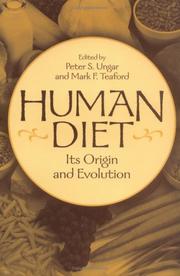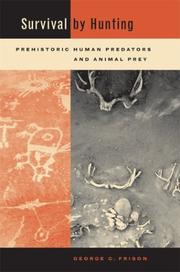| Listing 1 - 6 of 6 |
Sort by
|
Book
ISBN: 9781607814740 1607814749 9781607814733 1607814730 Year: 2016 Publisher: Salt Lake City
Abstract | Keywords | Export | Availability | Bookmark
 Loading...
Loading...Choose an application
- Reference Manager
- EndNote
- RefWorks (Direct export to RefWorks)
Indians of North America --- Hunting, Prehistoric --- American bison hunting --- Hunting, Primitive --- Hunting and foraging, Prehistoric --- Hunting and gathering, Prehistoric --- Prehistoric hunting --- Bison hunting --- Buffalo hunting --- Big game hunting --- Antiquities. --- History. --- Hunting.
Book
ISBN: 331922350X 3319223518 Year: 2016 Publisher: Cham : Springer International Publishing : Imprint: Springer,
Abstract | Keywords | Export | Availability | Bookmark
 Loading...
Loading...Choose an application
- Reference Manager
- EndNote
- RefWorks (Direct export to RefWorks)
The people who inhabited Southwest Europe from 30,000 to 13,000 years ago are often portrayed as big game hunters – and indeed, in some locations (Cantabrian Spain, the Pyrenees, the Dordogne) the archaeological record supports this interpretation. But in other places, notably Mediterranean Iberia, the inhabitants focused their hunting efforts on smaller game, such as rabbits, fish, and birds. Were they less effective hunters? Were these environments depleted of red deer and other large game? Or is this evidence of Paleolithic people’s adaptability? This volume explores these questions, along the way delving into the history of the “bigger equals better” assumption; optimal foraging theory and niche construction theory; and patterns of environmental and subsistence change across the Pleistocene-Holocene transition.
Social sciences. --- Anthropology. --- Social Sciences. --- Paleolithic period --- Hunting, Prehistoric --- Prehistoric peoples --- Food --- Cavemen (Prehistoric peoples) --- Early man --- Man, Prehistoric --- Prehistoric archaeology --- Prehistoric human beings --- Prehistoric humans --- Prehistory --- Hunting, Primitive --- Hunting and foraging, Prehistoric --- Hunting and gathering, Prehistoric --- Prehistoric hunting --- Eolithic period --- Old Stone age --- Palaeolithic period --- Human beings --- Antiquities, Prehistoric --- Stone age --- Primitive societies --- Social sciences

ISBN: 0897897366 0313011397 9780313011399 1280908408 9781280908408 9780897897365 9786610908400 6610908400 9798400667206 Year: 2002 Publisher: Westport, Conn. Bergin & Garvey
Abstract | Keywords | Export | Availability | Bookmark
 Loading...
Loading...Choose an application
- Reference Manager
- EndNote
- RefWorks (Direct export to RefWorks)
Prehistoric peoples --- Hunting, Prehistoric. --- Agriculture, Prehistoric. --- Hunting and gathering societies. --- Diet --- Homme préhistorique --- Chasse préhistorique --- Agriculture préhistorique --- Chasseurs-cueilleurs --- Alimentation --- Food. --- History. --- Histoire --- Health --- Food --- Food habits --- Nutrition --- Food gathering societies --- Gathering and hunting societies --- Hunter-gatherers --- Hunting, Primitive --- Ethnology --- Subsistence hunting --- Prehistoric agriculture --- Hunting and foraging, Prehistoric --- Hunting and gathering, Prehistoric --- Prehistoric hunting --- Agriculture, Prehistoric --- Agriculture --- Primitive societies

ISBN: 1282356224 9786612356223 0520927966 9780520927964 9780520231900 0520231902 9781282356221 6612356227 Year: 2004 Publisher: Berkeley University of California Press
Abstract | Keywords | Export | Availability | Bookmark
 Loading...
Loading...Choose an application
- Reference Manager
- EndNote
- RefWorks (Direct export to RefWorks)
The North American Great Plains and Rocky Mountains have yielded many artifacts and other clues about the prehistoric people who once lived there, but little is understood about the hunting practices that ensured their survival for thousands of years. Noted archaeologist George Frison brings a lifetime of experience as a hunter, rancher, and guide to bear on excavation data from the region relating to hunting, illuminating prehistoric hunting practices in entirely new ways. Sharing his intimate knowledge of animal habitats and behavior and his familiarity with hunting strategies and techniques, Frison argues that this kind of firsthand knowledge is crucial for understanding hunting in the past.
Hunting and gathering societies. --- Paleo-Indians --- Hunting, Prehistoric. --- Food gathering societies --- Gathering and hunting societies --- Hunter-gatherers --- Hunting, Primitive --- Ethnology --- Subsistence hunting --- Paleo-Americans --- Paleo-Amerinds --- Paleoamericans --- Paleoamerinds --- Paleoindians --- Stone age --- Indians --- Prehistoric peoples --- Hunting and foraging, Prehistoric --- Hunting and gathering, Prehistoric --- Prehistoric hunting --- Hunting. --- american west. --- animal populations. --- animals as food. --- animals. --- antelope. --- apex predator. --- big horn mountains. --- bison. --- buffalo. --- conservation. --- deer. --- elk. --- environment. --- environmentalism. --- extinct animals. --- food studies. --- frontier. --- human animal relationships. --- hunter gatherer. --- hunting. --- indigenous culture. --- indigenous peoples. --- mountain sheep. --- mule deer. --- natural world. --- nature. --- nonfiction. --- paleo indians. --- persistence predator. --- plains animals. --- predator. --- prehistoric. --- prey. --- pronghorn. --- ranching. --- rocky mountains. --- substance hunting.
Book
ISBN: 9781107023277 1107023270 110723185X 1280394234 9786613572158 1139337998 1139340441 1139342029 1139337122 1139338862 1139150979 9781139150972 9781139338868 9781139340441 9781139337120 1139334530 Year: 2012 Publisher: New York Cambridge University Press
Abstract | Keywords | Export | Availability | Bookmark
 Loading...
Loading...Choose an application
- Reference Manager
- EndNote
- RefWorks (Direct export to RefWorks)
"In the field of human evolution, few subjects have generated as much controversy as the fate of the Neandertals. Most debates have centered on the problem of their affiliation with early modern humans. This book examines the hypothesis that Neandertals and early modern humans differed in terms of subsistance. To assess this hypothesis, the analysis focuses on animal bones accumulated by these groups at Saint-Cesaire, a collapsed cave in western France. The faunal evidence suggests that Neandertals and early modern humans exploited a similar range of game species"--Résumé de l'éditeur.
Paleolithic period --- Neanderthals --- Animal remains (Archaeology) --- Hunting and gathering societies --- Hunting, Prehistoric --- Paléolithique --- Homme de Néanderthal --- Restes d'animaux (Archéologie) --- Chasseurs-cueilleurs --- Chasse préhistorique --- Saint-Césaire Rockshelter (France) --- Saint-Césaire, Abri-sous-roche de (France) --- Hunting, Primitive --- Hunting and foraging, Prehistoric --- Hunting and gathering, Prehistoric --- Prehistoric hunting --- Food gathering societies --- Gathering and hunting societies --- Hunter-gatherers --- Ethnology --- Subsistence hunting --- Archaeozoology --- Zooarchaeology --- Zoology in archaeology --- Archaeology --- Bones --- Animal paleopathology --- Homo mousteriensis --- Homo neanderthalensis --- Homo primogenicus --- Homo sapiens neanderthalensis --- Neandertalers --- Neandertals --- Neanderthal race --- Neanderthalers --- Fossil hominids --- Eolithic period --- Old Stone age --- Palaeolithic period --- Stone age --- Methodology --- Roche à Pierrot Rockshelter (France) --- France --- Antiquities --- Social Sciences --- Archeology --- Saint-Cesaire Rockshelter (France)
Book
ISBN: 0520955129 9780520955127 9780520274006 0520274008 Year: 2013 Publisher: Berkeley University of California Press
Abstract | Keywords | Export | Availability | Bookmark
 Loading...
Loading...Choose an application
- Reference Manager
- EndNote
- RefWorks (Direct export to RefWorks)
Travis Rayne Pickering argues that the advent of ambush hunting approximately two million years ago marked a milestone in human evolution, one that established the social dynamic that allowed our ancestors to expand their range and diet. He challenges the traditional link between aggression and human predation, however, claiming that while aggressive attack is a perfectly efficient way for our chimpanzee cousins to kill prey, it was a hopeless tactic for early human hunters, who-in comparison to their large, potentially dangerous prey-were small, weak, and slow-footed. Technology that evolved from wooden spears to stone-tipped spears and ultimately to the bow and arrow increased the distance between predator and prey and facilitated an emotional detachment that allowed hunters to stalk and kill large game. Based on studies of humans and of other primates, as well as on fossil and archaeological evidence, Rough and Tumble offers a new perspective on human evolution by decoupling ideas of aggression and predation to build a more realistic understanding of what it is to be human.
Hunting, Prehistoric. --- Hunting and gathering societies. --- Fossil hominids. --- Human evolution. --- Social evolution. --- Cultural evolution --- Cultural transformation --- Culture, Evolution of --- Culture --- Evolution --- Social change --- Evolution (Biology) --- Physical anthropology --- Evolutionary psychology --- Human beings --- Early man --- Fossil hominins --- Fossil man --- Hominids, Fossil --- Hominins, Fossil --- Human fossils --- Human remains (Archaeology) --- Primates, Fossil --- Paleoanthropology --- Food gathering societies --- Gathering and hunting societies --- Hunter-gatherers --- Hunting, Primitive --- Ethnology --- Subsistence hunting --- Hunting and foraging, Prehistoric --- Hunting and gathering, Prehistoric --- Prehistoric hunting --- Origin --- aggression. --- aggressive attack. --- ancestors. --- anthropology. --- ape men. --- archaeological evidence. --- archaeological record. --- archaeology. --- archeology. --- biology. --- dark. --- diet and evolution. --- early human hunters. --- emotional detachment. --- engaging. --- evolution. --- historical. --- history. --- hopeless tactic. --- human aggressiveness. --- human evolution. --- human hunters. --- human predation. --- hunter gatherers. --- hunting. --- intense. --- large game hunters. --- life sciences. --- man versus nature. --- man vs nature. --- popular science. --- proto humans. --- social science. --- wooden spears.
| Listing 1 - 6 of 6 |
Sort by
|

 Search
Search Feedback
Feedback About UniCat
About UniCat  Help
Help News
News